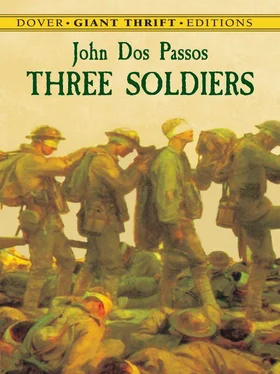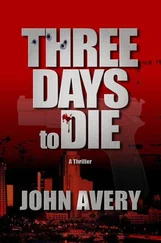The sun rose hot on a cloudless day. A few sparrows twittered about the tin roof of the barracks.
“Hell, we’re not goin’ this day.”
“Why?” asked somebody savagely.
“Troops always leaves at night.”
“The hell they do!”
“Here comes Sarge.”
Everybody craned their necks in the direction pointed out.
The sergeant strolled up with a mysterious smile on his face.
“Put away your overcoats and get out your mess kits.”
Mess kits clattered and gleamed in the slanting rays of the sun. They marched to the mess hall and back again, lined up again with packs and waited some more.
Everybody began to get tired and peevish. Fuselli wondered where his old friends of the other company were. They were good kids too, Chris and that educated fellow, Andrews. Tough luck they couldn’t have come along.
The sun rose higher. Men sneaked into the barracks one by one and lay down on the bare cots.
“What you want to bet we won’t leave this camp for a week yet?” asked someone.
At noon they lined up for mess again, ate dismally and hurriedly. As Fuselli was leaving the mess hall tapping a tattoo on his kit with two dirty finger nails, the corporal spoke to him in a low voice.
“Be sure to wash yer kit, buddy. We may have pack inspection.”
The corporal was a slim yellow-faced man with a wrinkled skin, though he was still young, and an arrow-shaped mouth that opened and shut like the paper mouths children make.
“All right, corporal,” Fuselli answered cheerfully. He wanted to make a good impression. “Fellers’ll be sayin’ ‘All right, corporal,’ to me soon,” he thought. An idea that he repelled came into his mind. The corporal didn’t look strong. He wouldn’t last long overseas. And he pictured Mabe writing Corporal Dan Fuselli, O.A.R.D.5.
At the end of the afternoon, the lieutenant appeared suddenly, his face flushed, his trench coat stiffer than ever.
“All right, sergeant; line up your men,” he said in a breathless voice.
All down the camp street companies were forming. One by one they marched out in columns of fours and halted with their packs on. The day was getting amber with sunset. Retreat sounded.
Fuselli’s mind had suddenly become very active. The notes of the bugle and of the band playing “The Star Spangled Banner” sifted into his consciousness through a dream of what it would be like over there. He was in a place like the Exposition ground, full of old men and women in peasant costume, like in the song, “When It’s Apple Blossom Time in Normandy.” Men in spiked helmets who looked like firemen kept charging through, like the Ku-Klux Klan in the movies, jumping from their horses and setting fire to buildings with strange outlandish gestures, spitting babies on their long swords. Those were the Huns. Then there were flags blowing very hard in the wind, and the sound of a band. The Yanks were coming. Everything was lost in a scene from a movie in which khaki-clad regiments marched fast, fast across the scene. The memory of the shouting that always accompanied it drowned out the picture. “The guns must make a racket, though,” he added as an after-thought.
“Atten-shun!
“Forwa-ard, march!”
The long street of the camp was full of the tramping of feet. They were off. As they passed through the gate Fuselli caught a glimpse of Chris standing with his arm about Andrews’s shoulders. They both waved. Fuselli grinned and expanded his chest. They were just rookies still. He was going overseas.
The weight of the pack tugged at his shoulders and made his feet heavy as if they were charged with lead. The sweat ran down his close-clipped head under the overseas cap and streamed into his eyes and down the sides of his nose. Through the tramp of feet he heard confusedly cheering from the sidewalk. In front of him the backs of heads and the swaying packs got smaller, rank by rank up the street. Above them flags dangled from windows, flags leisurely swaying in the twilight. But the weight of the pack, as the column marched under arc lights glaring through the afterglow, inevitably forced his head to droop forward. The soles of boots and legs wrapped in puttees and the bottom strap of the pack of the man ahead of him were all he could see. The pack seemed heavy enough to push him through the asphalt pavement. And all about him was the faint jingle of equipment and the tramp of feet. Every part of him was full of sweat. He could feel vaguely the steam of sweat that rose from the ranks of struggling bodies about him. But gradually he forgot everything but the pack tugging at his shoulders, weighing down his thighs and ankles and feet, and the monotonous rhythm of his feet striking the pavement and of the other feet, in front of him, behind him, beside him, crunching, crunching.
The train smelt of new uniforms on which the sweat had dried, and of the smoke of cheap cigarettes. Fuselli awoke with a start. He had been asleep with his head on Bill Grey’s shoulder. It was already broad daylight. The train was jolting slowly over cross-tracks in some dismal suburb, full of long soot-smeared warehouses and endless rows of freight cars, beyond which lay brown marshland and slate-grey stretches of water.
“God! that must be the Atlantic Ocean,” cried Fuselli in excitement.
“Ain’t yer never seen it before? That’s the Perth River,” said Bill Grey scornfully.
“No, I come from the Coast.”
They stuck their heads out of the window side by side so that their cheeks touched.
“Gee, there’s some skirts,” said Bill Grey. The train jolted to a stop. Two untidy red-haired girls were standing beside the track waving their hands.
“Give us a kiss,” cried Bill Grey.
“Sure,” said a girl, — “anythin’ fer one of our boys.”
She stood on tiptoe and Grey leaned far out of the window, just managing to reach the girl’s forehead.
Fuselli felt a flush of desire all over him.
“Hol’ onter my belt,” he said. “I’ll kiss her right.”
He leaned far out, and, throwing his arms around the girl’s pink gingham shoulders, lifted her off the ground and kissed her furiously on the lips.
“Lemme go, lemme go,” cried the girl.
Men leaning out of the other windows of the car cheered and shouted.
Fuselli kissed her again and then dropped her.
“Ye’re too rough, damn ye,” said the girl angrily.
A man from one of the windows yelled, “I’ll go an’ tell mommer”; and everybody laughed. The train moved on. Fuselli looked about him proudly. The image of Mabe giving him the five-pound box of candy rose a moment in his mind.
“Ain’t no harm in havin’ a little fun. Don’t mean nothin’,” he said aloud.
“You just wait till we hit France. We’ll hit it up some with the Madimerzels, won’t we, kid?” said Bill Grey, slapping Fuselli on the knee.
Everybody sang as the thumping of wheels over rails grew faster. Fuselli looked about contentedly at the company sprawling over their packs and equipment in the smoky car.
“It’s great to be a soldier,” he said to Bill Grey. “Ye kin do anything ye goddam please.”
“This,” said the corporal, as the company filed into barracks identical to those they had left two days before, “is an embarkation camp, but I’d like to know where the hell we embark at.” He twisted his face into a smile, and then shouted with lugubrious intonation: “Fall in for mess.”
It was pitch dark in that part of the camp. The electric lights had a sparse reddish glow. Fuselli kept straining his eyes, expecting to see a wharf and the masts of a ship at the end of every alley. The line filed into a dim mess hall, where a thin stew was splashed into the mess kits. Behind the counter of the kitchen the non-coms, the jovial first sergeant, and the business-like sergeant who looked like a preacher, and the wrinkled-faced corporal who had been on the Red Sox outfield, could be seen eating steak. A faint odor of steak frying went through the mess hall and made the thin chilly stew utterly tasteless in comparison.
Читать дальше












